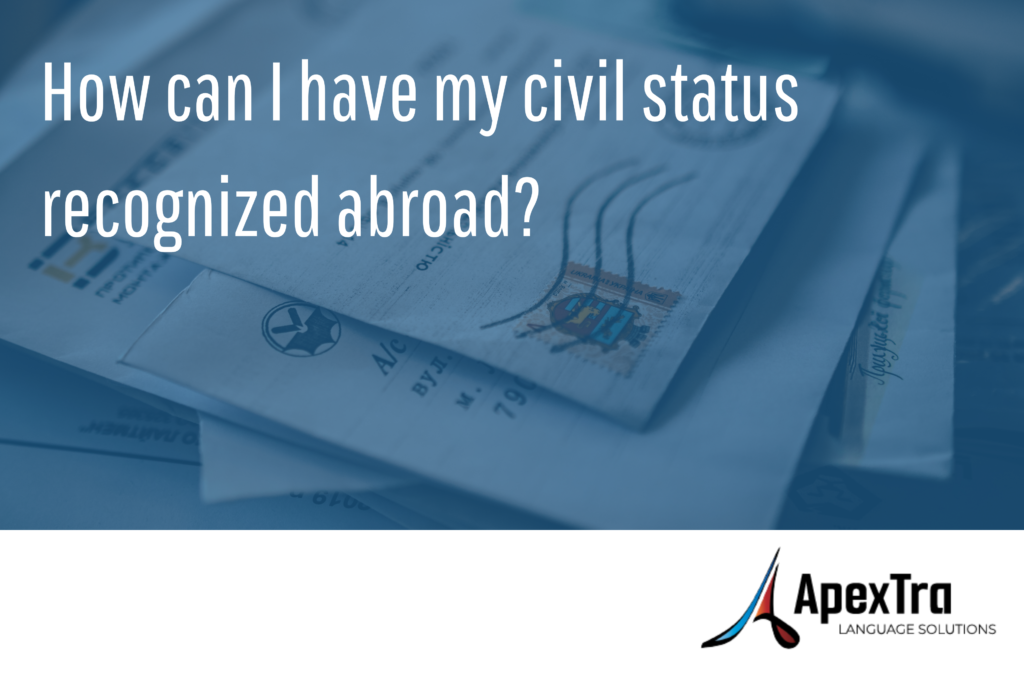
Recognition of civil status abroad: the new apostille and legalization procedure in 2025
Having your civil status recognized abroad is an essential step for many French people, whether they are emigrating, studying, getting married or working abroad. Faced with administrative complexity, the Hague Convention of October 5, 1961 simplified the legalization of official documents through the apostille procedure. In 2025, a major reform will further modernize and facilitate these procedures. Find out everything you need to know to get your documents recognized internationally.
What are apostilles and legalization?
The apostille is a formality that attests the authenticity of the signature, the capacity of the signatory and, where applicable, the seal or stamp affixed to a public document. It applies only to countries that have signed the Hague Convention. For other countries, the legalization procedure is still compulsory, and involves further authentication by the competent authorities.
Which documents require an apostille or legalization?
Many documents may require an apostille or legalization depending on the country of destination:
- Civil status records (births, marriages, deaths)
- Diplomas, transcripts, school certificates
- Judgements, court rulings, extracts from criminal records
- Notarial deeds (wills, donations, powers of attorney)
- Administrative certificates (residence, nationality, etc.)
- Commercial deeds (contracts, articles of association, assignments)
You need to check the requirements of the country you are sending the document to before starting the procedure.
The great reform of 2025: what’s changing?
Since May 1, 2025, French notaries have been put in charge of issuing apostilles, via fifteen regional councils or interdepartmental chambers of notaries. This replaces the role previously played by the Public Prosecutors’ Offices of the Courts of Appeal.
FromSeptember 1, 2025, legalization will also be handled by these notarial bodies, in place of the Ministry of Europe and Foreign Affairs.
The procedure is now entirely paperless: all apostilles are issued in electronic format, guaranteeing speed, security, and traceability.
How to obtain an apostille or legalization in 2025?
You have two options:
- Online via this platform
- At the counter of one of the fifteen competent notarial chambers or councils
To find out which notary is responsible for your area, consult the map of notarial chambers or councils.
Procedure for translated documents
If your document needs to be translated, the translator’s signature must be legalized before an apostille can be requested. This authenticates the translator’s identity, but does not guarantee the content of the translation. Signature legalization can be carried out at the town hall or before a notary, and it is advisable to specify this when requesting a quote from the translator, as this service is usually billed extra.
Rates and wait times
The reform introduces a fee for issuing apostilles:
- €10 excl. VAT per document (up to three documents)
- €20 excl. VAT for urgent delivery within 24 hours
- Reduced rates from the fourth document onwards
- Delivery charges may be added depending on the method of collection chosen.
Exemptions for the European Union
Since 2019, certain public documents circulating between EU member states are exempt from any legalization or apostille formalities, in accordance with Regulation (EU) 2016/1191.
The procedure to follow as of 2025
- Check whether your document requires an apostille or legalization, depending on the destination country.
- Prepare your original documents, and have the translator’s signature legalized (aka authenticated) if necessary.
- Submit your request online or at a notarial chamber or council.
- Pay the corresponding fee.
- Receive your apostille or legalized document in electronic format.
More information
- Notaires de France: Apostille and legalization – news and procedures
- Service-Public.fr: Legalization or apostille of a French public document for a foreign authority
- Legalization by the Ministry of Europe and Foreign Affairs:
Recognition of civil status abroad is facilitated by the Hague Convention. Understanding the apostille process, the types of documents involved, and the necessary steps can simplify this administrative process. By following these steps, you can ensure the legalization and international recognition of your official documents abroad. Do you need help with your business? Please contact us, we are happy to be of service.
In a rush? Order a sworn translation on our www.Trad24.com site, and use the code apextra for a discount!